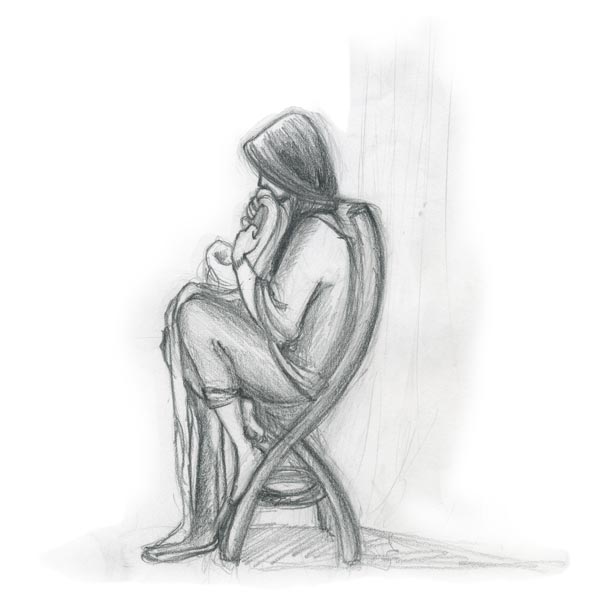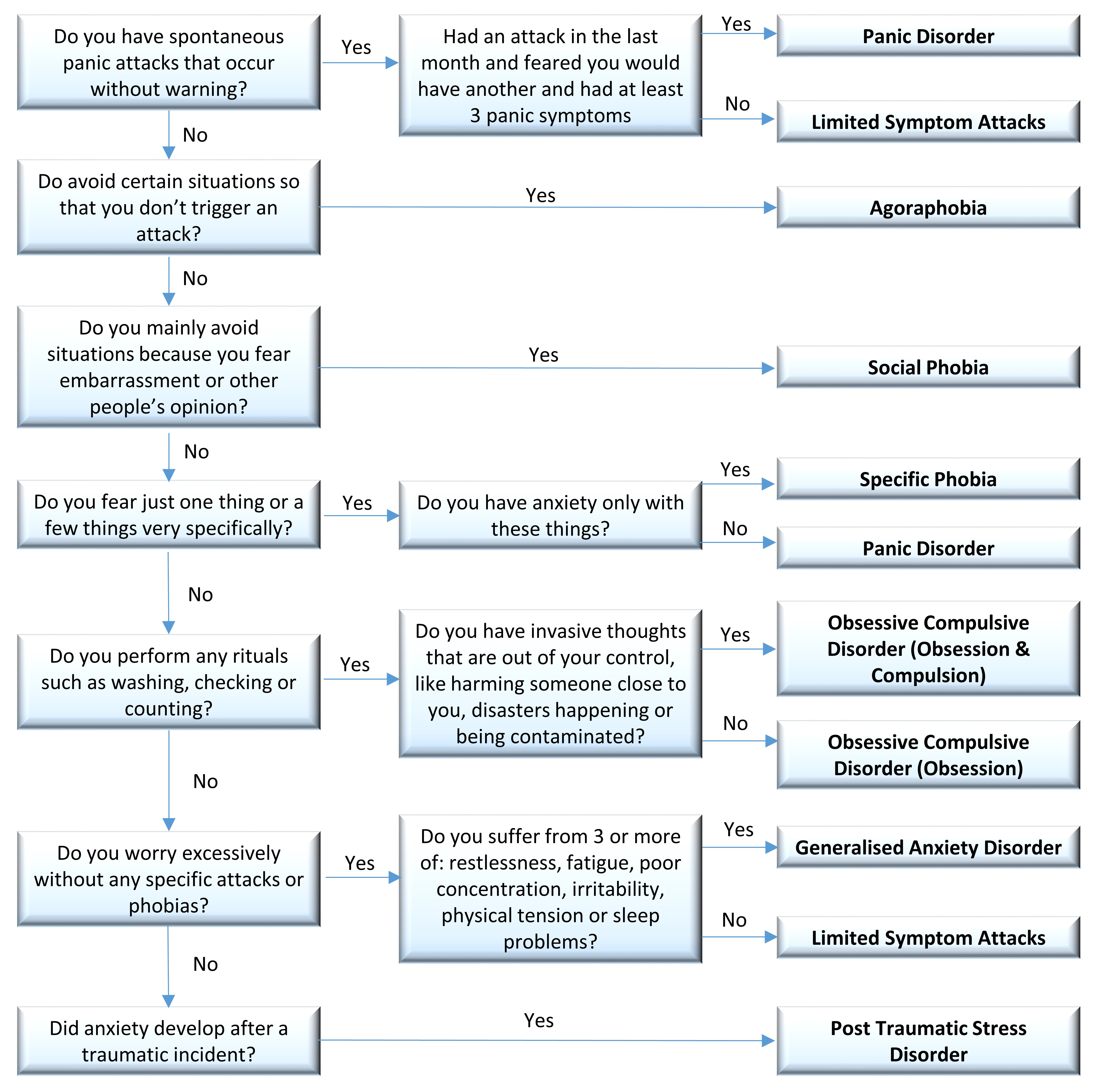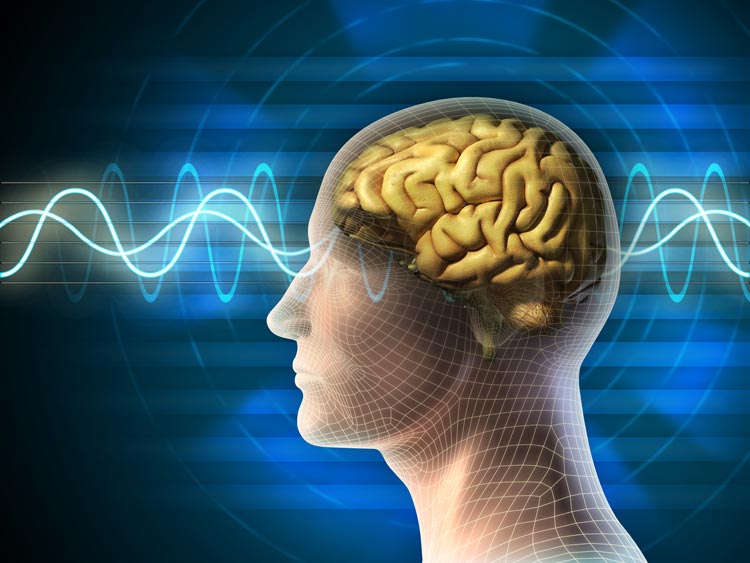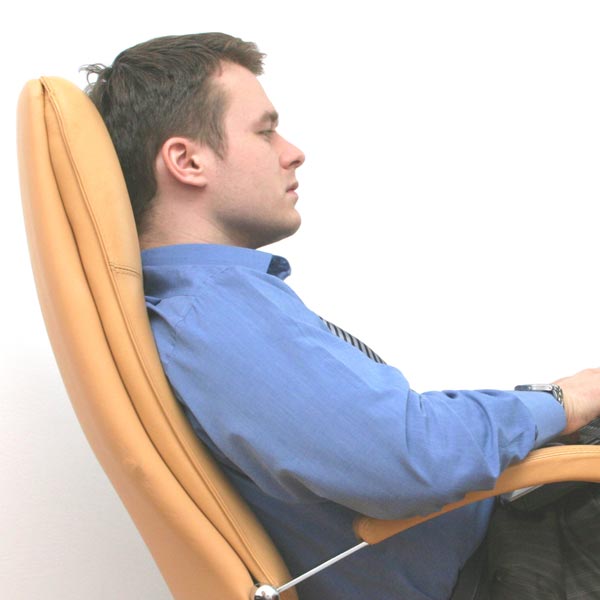The Treatment Of Anxiety Disorders
Anxiety disorders are all 100% treatable. They are well understood and there is a whole range of different techniques you can use to overcome any anxiety problems. The table below is very basic but it will give you an idea as to where you should direct your efforts to get the appropriate help that you may need.
Fear is essential to human survival. Anxiety attacks and other forms of anxiety are behaviors that have developed from inappropriate fear of particular situations. These reactions then become generalized and can be triggered at the wrong times.
Fear memories are learned faster and retained longer than other types of emotional memory. This is important. Learning to respond rapidly to danger makes sure that you do the right thing in event that the same thing happens again. It is an automatic behavior that is learnt very quickly and is essential to basic survival. It is this rapid learning that leaves us vulnerable to the development of anxiety
Research has shown that genes can be a factor in anxiety. Some people have a genetic predisposition which is then often triggered by some stressful life event. This event appears to change how the brain deals with fear.
An enormous number of people are affected every year by anxiety. Anxiety disorders are the most common mental illness in the United States. 19 million (13%) of the adult U.S. population (ages 18-54) are affected.


Anxiety Disorders
Panic Disorder
Panic disorder is characterized by anxiety attacks. An anxiety attack is a sudden feeling of intense fear or discomfort, seemingly from nowhere. It builds up rapidly and then fades over a period of about 10 minutes. However, sometimes they can recur repeatedly over a few hours.
You stop panic attacks with simple changes to the way you deal with them when they happen.

Agoraphobia
Agoraphobia is the fear of being in a situation from which you can’t escape and which could cause intense anxiety. As a result you avoid these situations. You can dismantle agoraphobia in the same way that it started; piece by piece. It is the combined effect of all the little changes that you make in the way you think and lead your life that will eliminate anxiety.

Social Phobia
Social phobia or anxiety is the fear of humiliation or embarrassment in social situations that causes you to avoid those situations. Adult sufferers realise that this fear is excessive. A very common example is public speaking phobia, though social phobia also includes fears about using public toilets, eating or writing in public, being watched while working or taking any sort of test or exam. Many sufferers of social phobia can point to something that made their condition worse, often family, parents, bullying, an illness, perhaps just a lingering feeling of something too far back to remember. You stop social phobias by building up some very straightforward patterns of thinking.

Specific Phobia
A specific phobia is a strong fear of something that you have to avoid even though you do not have panic attacks, the fear is more general. About 1 in 10 of us have strong dislike for one of the more common phobias but they do not affect our lives. If this is so strong that it begins to affect your life badly, then it has become a phobia and needs to be treated before avoidant behaviour can get out of hand.

Generalised Anxiety Disorder (GAD)
You keep yourself in a constant state of anxiety with the thoughts that you have. Learning to control your thoughts can prevent your mind endlessly going in circles. It really is very easy to do. You don’t have to be Buddhist to realise the wisdom in Buddha’s words
“You are what you think,
Everything that you are, arises with your thoughts
With your thoughts you make the world.”

Limited Symptom Attacks (LSA)
Limited Symptom Attacks occur randomly and do not indicate a full blown anxiety disorder. However, you are still at risk. You will experience a few anxiety symptoms but will not be actively avoiding situations which you fear will trigger an anxiety attack.

Obsessive Compulsive Disorder (OCD)
Obsessions
Have you ever been to a zoo and watched a tiger pacing relentlessly back and forwards? Obsessions grow out of frustration and despair. If you suffer from any type of anxiety then you are probably doing the same thing in your mind; continually going over and over the same thoughts and worries. If you are so caught up in the moment then you can begin to act these out and they can grow into uncontrolled movements, even whole rituals.
Compulsions
Everyone has some strange and bizarre thoughts from time to time, but mostly these thoughts are instantly dismissed. But imagine (perhaps you don’t have to) that a particular thought is so disturbing that you can’t help asking yourself where it came from, why did you have that thought. By the very act of worrying about it you pull that thought back into your mind over and over again.
The real danger is that you examine it, perhaps even horrify yourself and you start to think that there is something wrong with you. Of course there is NOTHING wrong with you. All you did was to be over sensitive and start of examining something too closely and then blaming yourself.

Post Traumatic Stress Disorder (PTSD)
You can suffer from Post Traumatic Stress Disorder (PTSD) after exposure to particularly traumatic events. The effects are accumulative. It produces feelings of intense fear, helplessness, and horror brought about by reliving those severely traumatic events from the past through dreams, nightmares or flashbacks.

We offer a revolutionary combination of very different techniques developed over the past nine years at our therapy clinic in London.
 Anxiety and fear are controlled in the brain by a pair of small organs at its base known as the amygdala. In anxiety disorder this responds too quickly to ordinary situations, a little like a hair trigger on a gun.
Anxiety and fear are controlled in the brain by a pair of small organs at its base known as the amygdala. In anxiety disorder this responds too quickly to ordinary situations, a little like a hair trigger on a gun.
The differences in fear processing may be due to the existence of two main pathways into the amygdala. A higher one through the cortex which allows for conscious reasoning and a lower one directly from the sensory relay stations of the thalamus.
Associations made through the unconscious pathway are more vivid and harder to forget. It is at these deep unconscious levels that hypnosis can work to reprogram how the brain responds.
Treatment For Anxiety Disorders

Distraction Therapy
The idea is to prepare a particular memory or even an imagined scene in advance to use as a distraction. When you notice the onset of an anxiety attack you can then focus your attention upon this memory to break the cycle and prevent your anxiety from escalating.
Create a tool kit of distractions that you can use when needed.

Relaxation
Many people are living with unhealthy levels of stress. Finding a good way to relax may not only improve your health it may well improve your productivity and creativity.
I can tell you now, that 95% of the people that walk through the door of our practice in London do not know how to relax. Not having a good relaxation process is common to nearly all anxiety sufferers.

Exposure Therapy
Exposure therapy is the gradual exposure to risky anxiety provoking situations so that you can become comfortable with them.
This is only recommended with certain conditions and under supervision.

Exercise Motivation
Anyone can learn to love exercise. The hard part is… how to motivate yourself to start. Lifetime fitness is attainable by anyone, even if you have never had any interest in sport.
There appear to be two approaches to exercise motivation:
- The Traditional Work Hard At It Approach
- The Gradual Build Up Method

Dietary changes
. We strongly recommend that you become familiar with the idea of alkaline balance in diet.
Take your time. There is no need to dramatically change what you eat overnight. Trying to make too many changes too soon will have a negative effect. New diets demand new food preparation and cooking skills that take time to learn.

Deliberate changes in daily habits and lifestyle.
Many people are very set in their ways and not at all adaptable to change and find changing habits especially difficult, especially if they feel a need to control their environment to feel secure.
The first stage is to make a personal commitment to step outside your safety zone, break your usual routines and try a new approach. If what you have been doing up to now has not been working for then something needs to change. This technique has been used highly successfully to help people lose weight, based on the research by Professor Ben Fletcher, Dr. Karen Pine and Dr. Danny Penman at the University of Hertfordshire.

Self assessment skills training
Identify what creates feelings of anxiety or life situations and thoughts that trigger uncomfortable feelings. These are the areas that you need to focus on. Do this regularly to spot any progress you may be making.

Social skills training
Social skills training has been shown to be effective in treating patients with a broad range of emotional problems and diagnoses.
People who suffer from social phobia or shyness tend to avoid specific situations in which their limitations might cause them embarrassment.

Assertiveness and confidence building
elf esteem comes from comparing your expectations of yourself with what you actually accomplish. It is constantly changing based on what we do every day. It is always measured on a sliding scale from low to high. However it is just an attitude, a way of looking at the world. As such it can be learnt.

Breathing Techniques
Often, the fast shallow breathing that many of us have means that we hyperventilate. This reduces the carbon monoxide in our bloodstream, which in turn causes the carotid artery to our brain to restrict and trigger feelings of panic, stress and anxiety as levels of oxygen to our brain plummet. In effect your body is anchored by this physiological change to produce adrenaline.
